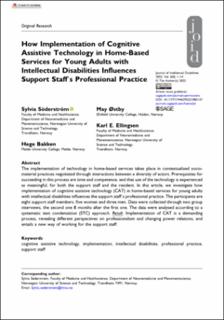| dc.contributor.author | Söderström, Sylvia | |
| dc.contributor.author | Bakken, Hege | |
| dc.contributor.author | Østby, May | |
| dc.contributor.author | Ellingsen, Karl E. | |
| dc.date.accessioned | 2023-01-11T15:06:54Z | |
| dc.date.available | 2023-01-11T15:06:54Z | |
| dc.date.created | 2022-02-24T12:41:11Z | |
| dc.date.issued | 2022 | |
| dc.identifier.citation | Journal of Intellectual Disabilities. 2022. | en_US |
| dc.identifier.issn | 1744-6295 | |
| dc.identifier.uri | https://hdl.handle.net/11250/3042773 | |
| dc.description.abstract | The implementation of technology in home-based services takes place in contextualised socio-material practices negotiated through interactions between a diversity of actors. Prerequisites for succeeding in this process are time and competence, and that use of the technology is experienced as meaningful, for both the support staff and the resident. In this article, we investigate how implementation of cognitive assistive technology (CAT) in home-based services for young adults with intellectual disabilities influences the support staff`s professional practice. The participants are eight support staff members, five women and three men. Data were collected through two group interviews, the second one 8 months after the first one. The data were analysed according to a systematic text condensation (STC) approach. Result: Implementation of CAT is a demanding process, revealing different perspectives on professionalism and changing power relations, and entails a new way of working for the support staff. Keywords: cognitive assistive technology, implementation, intellectual disabilities, professional practice, support staff | en_US |
| dc.language.iso | eng | en_US |
| dc.publisher | SAGE | en_US |
| dc.relation.uri | https://doi.org/10.1177/17446295221083137 | |
| dc.rights | Navngivelse 4.0 Internasjonal | * |
| dc.rights.uri | http://creativecommons.org/licenses/by/4.0/deed.no | * |
| dc.subject | cognitive assistive technology | en_US |
| dc.subject | implementation | en_US |
| dc.subject | intellectual disabilities | en_US |
| dc.subject | professional practice | en_US |
| dc.subject | support staff | en_US |
| dc.title | How implementation of cognitive assistive technology in home-based services for young adults with intellectual disabilities influences support staff`s professional practice | en_US |
| dc.type | Peer reviewed | en_US |
| dc.type | Journal article | en_US |
| dc.description.version | publishedVersion | en_US |
| dc.rights.holder | © The Author(s) 2022, Article Reuse Guidelines. | en_US |
| dc.subject.nsi | VDP::Medisinske Fag: 700::Helsefag: 800 | en_US |
| dc.source.journal | Journal of Intellectual Disabilities | en_US |
| dc.identifier.doi | 10.1177/17446295221083137 | |
| dc.identifier.cristin | 2005125 | |
| cristin.ispublished | true | |
| cristin.fulltext | original | |
| cristin.qualitycode | 1 | |

